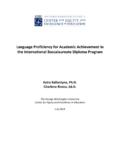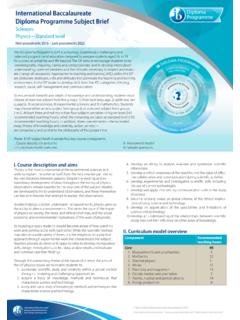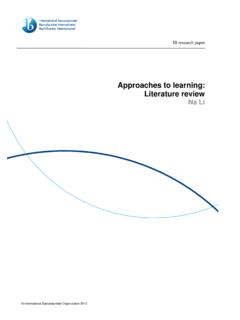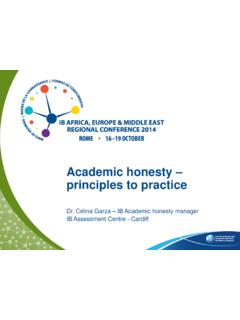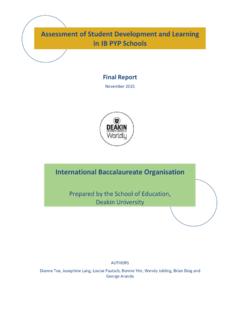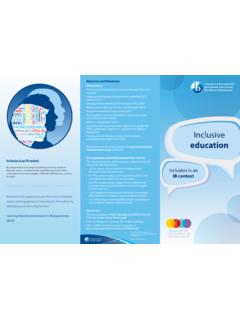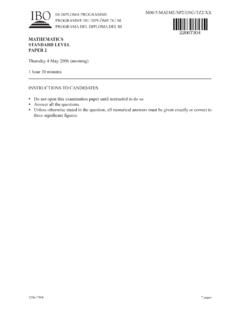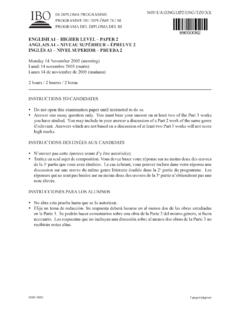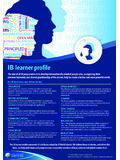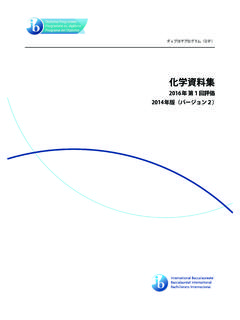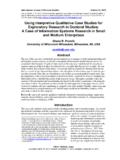Transcription of Indigenous Knowledge Systems Crossing Epistemological ...
1 Indigenous Knowledge Systems Crossing Epistemological Boundaries in Education By Ruairidh C MacKenzie IB ESS. iGCSE Environmental Management Real freedom will only come when we free ourselves of the domination of Western culture, Western education and the Western Way of being.. Mahatma Ghandi The school has been the main tool of the state to destroy the culture of Indigenous people.. Public Declaration of Indigenous People Oxaca, Mexico 1997. If you wanted to change an ancient culture in a generation, how would you do it? You would change the way it educates its children. - Interestingly, the modes of learning characteristic of many Indigenous cultures have the kind of flexibility, open-endedness, and intuitive nature that may be better suited to the organic growth of human intelligence and creativity than the modern regimes of state-standardized curricula and testing.
2 Carol Black- Blog Schooling the World The Whiteman's Last Burden Why might (some) Indigenous groups reject modern schooling? Do we have anything to learn from Indigenous education models? Where does the IB, ESS and TOK fit into all this? Part 1. Introduction Establish concept of different ways of knowing Part 2. Identification of IK and Universal Knowledge ' divergence of Knowledge Systems Justification for revaluation IK post colonial framework Part 3. Implications of divergence in education Part 4. Crossing Epistemological boundaries in education BE/ICBE. Part 5. Case study: Incorporating IKS into modern school curriculum - Local Curriculum Mozambique findings Part 6. Implications of findings for Western Education What can we learn from IE models? How does IB, ESS and TOK fit into this? Question and Answer Definitions of terms: Cognition the mental action or process of acquiring Knowledge and understanding through thought, experience, and the senses.
3 Epistemology "the nature of human Knowledge and understanding that can possibly be acquired through different types of inquiry and alternative methods of investigation. (Hirschheim et al., 1995:20). Ontology "a branch of philosophy concerned with articulating the nature and structure of the world. Wand and Weber (1993:220). Background Bio-diversity/ethno-diversity Cultural relevancy IK and IE in development of local communities Counter-point to uniformity of global education models Integration of both models a need to open up new moral and cognitive spaces which constructive dialogue between people and between Indigenous Knowledge Systems (IKS) can occur . Visvanathan 1997 cited in Odora-Hoppers 2002:4. The concept of knowledges, in contrast to a single Knowledge , assumes the existence of multiple ways of seeing the world (Spring 2009:145).
4 Perception What do you see? Perception What do you see? Grounded Cognition' cultural transmission of Knowledge Part 2. Clash of Knowledge Systems Indigenous people - characteristics: long-term occupancy of the land tribal organization and subsistence-oriented production a social and cultural identity distinct from dominant societies Spring 2009:172. Indigenous Knowledge Systems IK as holistic' Knowledge and in which humans, nature and the spirit world are all interconnected Spring 2009: Breidlid 2009: 143; Odora-Hoppers 2002: 30. Soil and Soul - Land and Community Seeing' 30 secs A Thousand Suns ( ). Indigenous Knowledge Systems Western Universal' Knowledge Circle of life Legitimisation of IKS Post Colonial framework RACISM. CULTURAL IDENTITY. HYBRIDSM. AGENCY. The Things They Said New unbalanced relationships in globalisation & global capitalism Non-western societies' Knowledge Systems that sustained them are now taken as obsolete.
5 In the rush towards modernity, we, the newly modernised have not wanted to give those on who we have imposed the signifier of the obsolescence a voice.. (Odora-Hoppers 2002:3). Primacy of the written word Strategic disempowerment of traditional societies In this system a professional class of intellectuals serves the structures of organised domination by assessing, labeling, naming and constructing Knowledge and reality .. (Odora- Hoppers 2002:15). Hybridism Disproportionate influence of Western Knowledge ' & cultural norms Overall negative impacted Indigenous people in many ways I say what kind of development is it when the people live shorter lives than before? They catch HIV/AIDS. Our children are beaten in school and won't go. Some become prostitutes. They are not allowed to hunt. They fight because they are bored and get drunk.
6 They are starting to commit suicide. We never saw that before. Is this development? Roy Sesana Gana Bushman, Botswana ( ). Question of Agency? Edward Said's Orientalism dichotomy between the coloniser' and the colonised us'. Indigenous people as passive Danger of talking on behalf/for the other Cultural logic of predation'. Stone Age tribe kills fishermen who strayed on to island One of the world's last Stone Age tribes has murdered two fishermen whose boat drifted on to a desert island in the Indian Ocean. The Telegraph Saturday 4th October 2014. Face to face with Stone Age man: The Hadzabe tribe of Tanzania Daily Mail 20th July 2007. IKS taken as STATIC (Nel 2006:102). african worldviews and wisdom look like myth and superstitious metaphysics . (Breidlid 2009:142). Primitive 30 secs Re-evaluation of IK is there justified within the context of sustainable development because, it poses and alternative view to narrowly-focused scientific disciplines which may neglect the interconnectedness of natural phenomena.
7 (Breidlid 2009:242). QUESTION: Which lens' should IK be engaged within education, to prevent it from being de-contextualised from its own rationality through the lens of an imposed way of knowing? Part 3. Implications of clash of Knowledge Systems on Education The Traditional - Modern Dichotomy Formal Education Indigenous Education epistemologies linked to epistemologies rooted modernity in traditional cultures of urban local people Premise of Western Knowledge '. Emphasis on universalism and compartmentalisation of Knowledge At odds with holism of traditional Knowledge `..the african child finds him/herself having to cross the cultural border between his/her african world view to that of the school science as he/she learns scientific concepts presented to him or her in the classroom . Fakudze 2003b quoted in Breidlid 2009:144.
8 Problem of single language For many people the loss of language brings loss of identity and sense of community, loss of traditional spirituality, and even loss of the will to live'. Daniel Everett linguist lived with Pirah Brazilian Amazon school failure cultural alienation high drop out rejection of the community Story so Existence multiple ways of knowing Recognition of IK as different to universal Knowledge Need to revaluate IK due to violence of colonial and neocolonial encounter through globalisation IKS as dynamic and hybridised How can IK be transported into mainstream education? Should it be transported to the classroom? Due to holistic' nature of IK would it lose its intrinsic value as soon as it is removed from the community in which it is embedded? PART 4. Crossing Epistemological Boundaries in education Bilingual Education (BE) - the instruction given to students of minority groups in their native language, with gradual introduction of a dominant language Intercultural Bilingual Education (IBE) - aims to incorporate minority groups own language, culture and history and Knowledge base into the curriculum and classroom instruction thereby increasing cultural relevance Importance of Mother Tongue place where the relationship of exclusion and domination is crystallized, but also where these relations are negotiated, produced and reproduced.
9 Semprini 1999: 67. Key to communication in classroom Single language still dominates education in many LEDCs Tension cultural relevancy vs national unity Dilution of cultural differences for sake of EFA. Objectives of BE and IBE: LEARNING and PRESERVATION OF IDENTITY. Instrumental use' of both L1(mother tongue) and IK in basic education Link to Human capital theories of development and education Bilingual element successfully employed VS intercultural aspect was side-lined More of the same? Emphasis on technical aspects of IK within a modern curriculum = a continuation of the same exploitative and unequal relationship between the 2. Systems '. RECAP: ACTIVE COMMUNITY PARTICIPATION. THE USE OF MOTHER TONGUE / L1. the need for the reciprocal valorisation amongst Knowledge Systems (Houtondji cited in Odora-Hoppers 2002:V).
10 PART 5. The Local Curriculum - Mozambique pluri-lingual and pluri-cultural reality'. Local Curriculum Mozambique Ideological Background to LC. a component of the LC making 20% of the curriculum of the total time for the teaching of each discipline. This component is constituted by contents defined locally as being relevant, for the integration of the child into his community (INDE 2003 cited in Castiano 2006:16). OBJECTIVE: ..is to train/form citizens capable of contributing to the bettering of their life, the life of their family, of the community and of the parents, taking into consideration local Knowledge from the communities where the school is situated (INDE 1999 cited in ibid 2006:16). Open a space for local Knowledge to enter into basic education.. Castiano 2006:16. Re-Evaluation of Universal' Science african countries reduced to exporters of both primary materials and empirical data to Western countries monolingual education system in Mozambique facilitates but incentivises this extractive model and the continuing exclusion of the majority of its citizens imitate Western Science and technologies How to elevate the status of IK?
